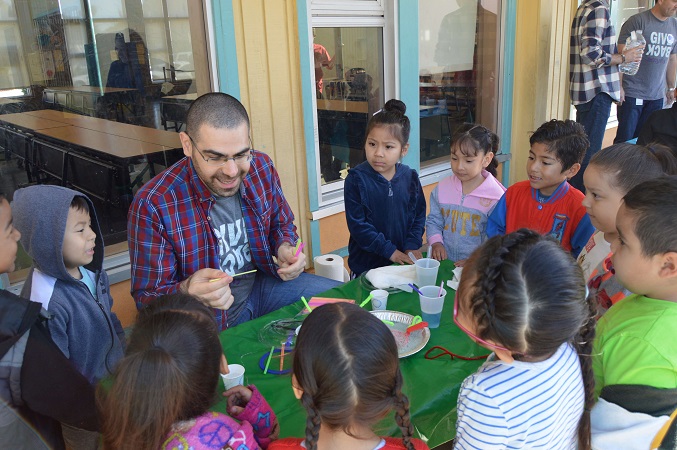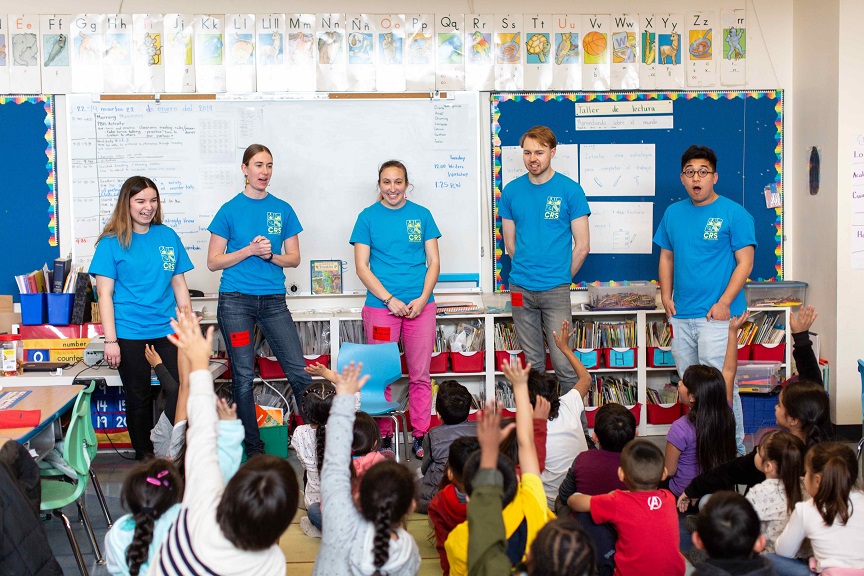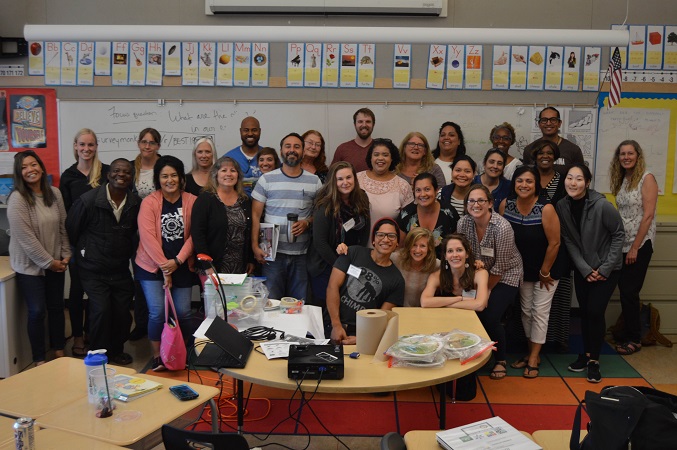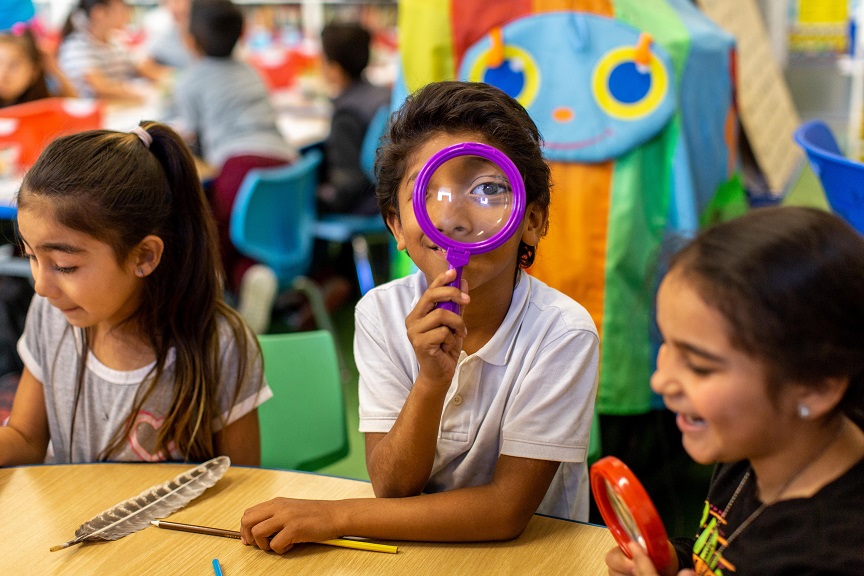
Community Resources for Science: Getting Kids and Their Teachers, Excited About Science
Community Resources for Science (CRS) is about making science exciting for children and their teachers. The sad fact is that many elementary schools no longer teach science, and kids are missing out on what just might make them pursue a career in STEM-related careers. If that happens, not only will the children miss out on bettering their futures, but society will miss out, as a whole. If we lack scientists, we won’t find cures for cancer, or discover new green energy solutions.
For all these reasons—and so many more—we were happy to support CRS with a small grant. We were also eager to learn more about the tricks of the trade: for instance, about how CRS is using real scientists to teach children science. We had a chat with Community Resources for Science Executive Director Teresa Barnett, to learn more about this work:
Kars4Kids: What are the types of resources provided by CRS that schoolchildren may lack?
Teresa Barnett: Many people are surprised to learn that in California, and across much of the country, science is too often missing from elementary classrooms. Because standardized tests focus mainly on math and reading, and because elementary teachers too often receive little training or support in teaching science, children miss out on important opportunities to experiment, wonder, and discover through science explorations at school. The lack of science in school contributes to a widening of the racial and socioeconomic achievement gap, depriving students of science enrichment and role models who can foster interest and encourage children to imagine themselves in careers where their creativity can help solve our most pressing challenges.
CRS works to make sure children have opportunities to meet diverse, enthusiastic scientists and engineers who come into classrooms to lead science and engineering lessons and to serve as role models. Children and scientists laugh and learn together as they explore robots, bubbles, plants, space, and much more. Children discover connections between things they are interested in, like roller coasters or puppies, and important scientific principles that help them build an understanding of their world. Seeing their students so engaged helps motivate teachers to bring even more science into their classrooms, with help from CRS.

Kars4Kids: Tell us about your BASIS role model program. Why is it important for kids to do science with real scientists? We’d love to hear about some of your scientist volunteers.
Teresa Barnett: Every year, more than 650 diverse, enthusiastic scientists and engineers volunteer their time to go directly into Kindergarten through 8th grade classrooms to “do” science and engineering with kids. This brings exciting, high-quality learning to 16,000 K-8 children, and offers teachers an opportunity to see firsthand how active, hands-on learning engages all kinds of students – especially those who might otherwise struggle with traditional instruction or who are English language learners. Through the BASIS lessons, children discover that scientists and engineers are just like them and people in their families and neighborhoods – they are women and men from all ethnicities and backgrounds, who play soccer or have pets just like the kids.
The majority of our volunteers are graduate students at UC Berkeley, and the rest come from local employers big and small whose jobs are directly connected to the science and engineering that are so critical to the Bay Area economy. In addition to the fun science lesson, kids have a chance to learn about career pathways. They are always amazed to hear grad students describe themselves as being in “Grade 20”!
The scientists are greeted like rock stars, with a mix of enthusiasm and awe from the children. In addition to developing their own skills in communicating about complex scientific ideas with non-scientists, the volunteers tell us volunteering with BASIS reminds them why they got into science in the first place. Seeing those “lightbulb moments” when children make a discovery, or being able to serve as a role model to girls or students of color, is a major reason the scientists are so dedicated to the BASIS program.

Kars4Kids: You offer support for teachers by way of your Teacher Membership Services. Talk to us about that. What types of services have you provided? How many teachers typically turn to you for help during the course of the year?
Teresa Barnett: The BASIS program is an important part of our multi-strand approach to strengthening science teaching and learning. We view it as akin to taking a friend out to lunch – an opportunity to deepen a long-term relationship. CRS serves nearly 1,800 Kindergarten through 8th grade teachers across more than 140 schools, impacting learning for 45,000 children. Throughout the year, we provide teachers with timely information bulletins about new field trips, grants, training, and other opportunities to bring more science and engineering into their classrooms. We are available on call to help them find resources, plan lessons, and strengthen the science culture of their schools. This can range from helping a new teacher understand the science curriculum for his grade; helping a veteran teacher plan a new field trip experience for students; or helping a principal organize a family science festival to engage parents, teachers and students together in joyful learning.
We are delighted to partner with all the major science centers, and more than 200 partner organizations such as regional parks, environmental education programs, science enrichment programs, teacher training programs and much more. We provide opportunities for teachers to explore, and to strengthen their skills and confidence so they can integrate more science and engineering into their classrooms, helping their students discover the power of active, curiosity driven learning.

Kars4Kids: What is the Science Super Star Challenge? What need does it serve?
Teresa Barnett: Sometimes, greatness needs a little nudge and a moment to shine! Many years ago, teachers who we knew were making great efforts in science told us they did it because they understood how important it was for their students, but that there was little in the way of encouragement (and sometimes they even faced discouragement from principals who only wanted to focus on math or reading test scores.) And others said they had so little training they weren’t even sure what “good” science teaching in elementary school would look like.
So, with help from teachers and our Advisory Council of experts we created the Science Super Star Challenge as a way to illustrate “best practice” in elementary science teaching, and to hold up and recognize those teachers who documented their efforts to meet the challenge. The first year, about a dozen teachers met the challenge, and each year we’ve raised the bar to reflect the increasing demands of California’s new science standards. And now we are delighted to honor around 100 teachers each year who earn recognition for excellence in science education, demonstrating for their peers that it CAN be done!
We celebrate them with a special luncheon event, and spend the springtime visiting classrooms to deliver awards and prizes to the teachers and students – about 3,000 kids receive books of their very own, science materials, or opportunities to go on special field trips or have presentations at their school. Teachers tell us the program helps them to grow as professionals, and to motivate their fellow teachers to join in and teach more science. The program provides incentive, recognition, and celebration, and each year we see the impact as more teachers improve their skills, more schools spend more time on science, and school communities embrace a “science identity” through family festivals, science fairs, career events, and more.
Kars4Kids: Tell us about the concept of Family Science-Engineering Nights. Why is it important to involve the family in a child’s exploration of science?
Teresa Barnett: Families are the most important teachers of young children. It is critical to involve families in understanding how science and engineering – which are part of everyday life, from cooking and household repairs, to transportation and recreation – are important to the futures of their children. Family science and engineering festivals empower caregivers, providing fun opportunities for learning and exploring together. Caregivers can see firsthand how they can use simple household materials to foster investigations at home too. CRS likes to work with schools to build their capacity within their own community to put on these events every year.
We’ve created online resources to provide schools with activities for these events – they can print out directions, signs, material lists, etc. And we provide training to teachers and parents so they can work together to put on fun, festive events – and even ways to have older students lead activity stations for younger children. A little popcorn or pizza for refreshment, and the school gym can be transformed into hub of tinkering, experimenting, and building community.
Kars4Kids: You offer field trips for teachers. Where have you taken teachers, and why?
Teresa Barnett: Sometimes teachers just need the opportunity to explore a science center or outdoor education space without having students in tow to supervise. Several times each year, CRS joins with some amazing partners to co-host events we call Field Trips for Teachers. These might include a sunset cruise on the San Francisco Bay to better understand the operations of the Port of Oakland, or a hike to the lighthouse and a visit to the Marine Mammal Center in Point Reyes, or some ‘behind the scenes’ exploration of the Exploratorium or Chabot Space and Science Center.
These opportunities allow teachers to meet science education providers, learn about resources that are available to them, network with their fellow teachers, and delve into a range of topics to learn more about bay ecology or space exploration or setting up maker spaces. Such events are useful for new teachers who are not familiar with places to take students on field trips, or for veteran teachers who have always “heard about” a place but never actually checked it out. The teachers tell us these events are often the highlight of their semester – free, fun, educational, inspirational, and a chance to connect in person with their “best friend a teacher can have – CRS!”
Kars4Kids: Your website has a section “Science at Home.” When should parents begin doing science with their children? What kinds of experiments can be done with children at home?
Teresa Barnett: It’s never too early to begin doing science with kids at home. Babies are natural scientists – closely watching and testing everything they can in order to understand how their world works. Playing with water at bath time, rolling balls down ramps, observing that we need a jacket today because it is raining – these are all things caregivers do naturally with their children.
CRS encourages teachers to share with families about the science they are learning in class, in order for families to extend that learning at home. Parents don’t need to purchase expensive science kits or robot toys – they can incorporate wonder, exploration and discovery with simple household materials. Explore properties of light with a flashlight and some different types of paper and materials: Kids discover that some materials let the light go through, while others make shadows. CRS maintains a section on our website with lots of activities to encourage exploration of how the world works using simple, inexpensive materials at home.

Kars4Kids: Why is science underrepresented in the schools? Is it something to do, perhaps, with science being sometimes interactive and even messy? Do teachers need encouragement to take a risk in order to properly teach science to our children?
Teresa Barnett: That’s a complicated question! There are many reasons that science is often missing from elementary schools, including the high attention given to standardized test scores. Students in most grades take statewide standardized tests each year in math and language arts, while in science, students are only tested once in elementary school, once in middle school, and once in high school – so these science scores are not as closely scrutinized when evaluating school quality and achievement.
Another reason is funding – it takes money for teacher training, for equipment and supplies, and for good curriculum that is not just a textbook. In addition, elementary teachers often do not have strong backgrounds in science themselves – in fact, some may have had negative experiences in their own high school days – so they can be apprehensive about teaching a subject in which there is not always a “right answer” at the back of the book. Effective science learning needs to allow students to explore, ask questions, figure things out – and that can get noisy, messy, and a bit unpredictable. To do it well, teachers need ongoing training, support, and partners. That’s where CRS comes in!
Kars4Kids: What would you say is the long-term impact of providing resources to teachers?
Teresa Barnett: There is a two-fold impact from our approach to providing resources to teachers. First, a kid only has one chance to be a first grader or a third grader, so they need to have great learning experiences now. CRS helps to ensure that teachers can bring scientists into their classrooms, try new lessons, take field trips, and “do” some science. And, as teachers have these experiences, they continue to build the confidence, motivation, and skills that amplify beyond today, to benefit both their current and future students.
Over time, CRS support leads to changes in teacher practice and school cultures, so that children have more opportunities to build understanding about their world, discover their own talents and interests in science, and develop scientific and environmental literacy. Teachers tell us their students are engaged, curious, and inspired. We have seen a dramatic change in many schools over time, and we continue to see progress every year in the schools we are serving.
Kars4Kids: What’s next at Community Resources for Science?
Teresa Barnett: We’re excited about the growing awareness of children, families, and teachers of the need to better understand our environment and climate, in order to take actions to protect and preserve our future. This is a great opportunity to engage even more teachers in developing skills, lessons, and resources to bring more science and engineering into their classrooms. We’re planning exciting teacher training events and workshops to meet the growing interest from even more teachers and schools. And, we’re excited to welcome even more scientists into our BASIS program to develop new, exciting lessons to bring to even more children in the coming year.
We look forward to continuing to grow our work connecting teachers, scientists, and students together to learn, share, explore discover, and be inspired, in order to build the next generation of inventors, problem-solvers, environmental stewards, and leaders. Thank you for the grant support that will help us to continue to share joyful learning experiences with children!